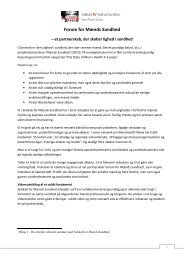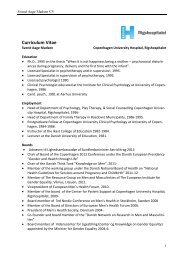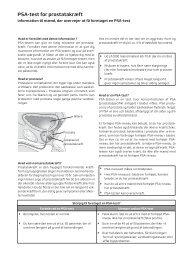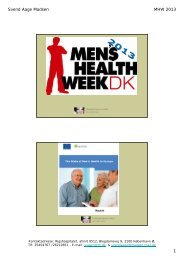Untitled
Untitled
Untitled
Create successful ePaper yourself
Turn your PDF publications into a flip-book with our unique Google optimized e-Paper software.
Summary<br />
The way men live their lives has a major effect on their overall health and<br />
wellbeing. From childhood onwards the lifestyles that many men develop are<br />
building up problems for their future, whether it’s smoking, excess alcohol<br />
intake, illicit drug use, poor diet or limited physical activity the effect is seen in<br />
their high rates of premature death and chronic morbidity.<br />
Young men feel they are living invulnerable lives, able to eat, drink and take<br />
risks without fear of the consequences; sometimes the reality is immediate,<br />
through the sudden death of alcoholic poisoning, or it may be cumulative<br />
effect as in the rising incidence of ischemic health disease or cancer in<br />
their early adult years. The risks men face are not only the consequence<br />
of the life choices they take, there are anatomical and physiological, social<br />
and environmental, and service provision factors that can compound the<br />
problems. An instance of this relates to the health problems men have when<br />
they are overweight, which are a complex blend of the availability of the<br />
right food, a socialisation process of boys with regard to their body size and<br />
their diet, an increasing sedentary lifestyle coupled with the male form of<br />
obesity comprising central (or visceral) fat deposition increasing the risk of<br />
the metabolic syndrome and the fat related cancers. This is then linked to the<br />
tendency for weight-loss health promotion and services being focused onto<br />
women.<br />
There is difficulty in agreeing the extent of sexually transmitted diseases, but<br />
it is apparent that the number of cases is increasing. However the targeting<br />
of men with regard to Chlamydia is showing that if the screening is done<br />
appropriately then men will engage. Getting men to use condoms is more<br />
effective in the young. Understanding men’s lifestyles is a significant factor<br />
in the development of health strategy aimed at supporting men to lead less<br />
damaging lives.<br />
Recommendations for Actions<br />
1. Provide an increased focus on preventative and health promotion<br />
programmes that have a specific focus on men, and that specifically<br />
target those subpopulations of men who are most in need (young<br />
men, lower socio-economic group men, ethnic minority men).<br />
2. Consult with men and those working with men in the community,<br />
voluntary and statutory sectors, to design preventative and health<br />
promotion programmes targeting men.<br />
3. Increase the focus on workplace health promotion initiatives that<br />
specifically target men<br />
7








